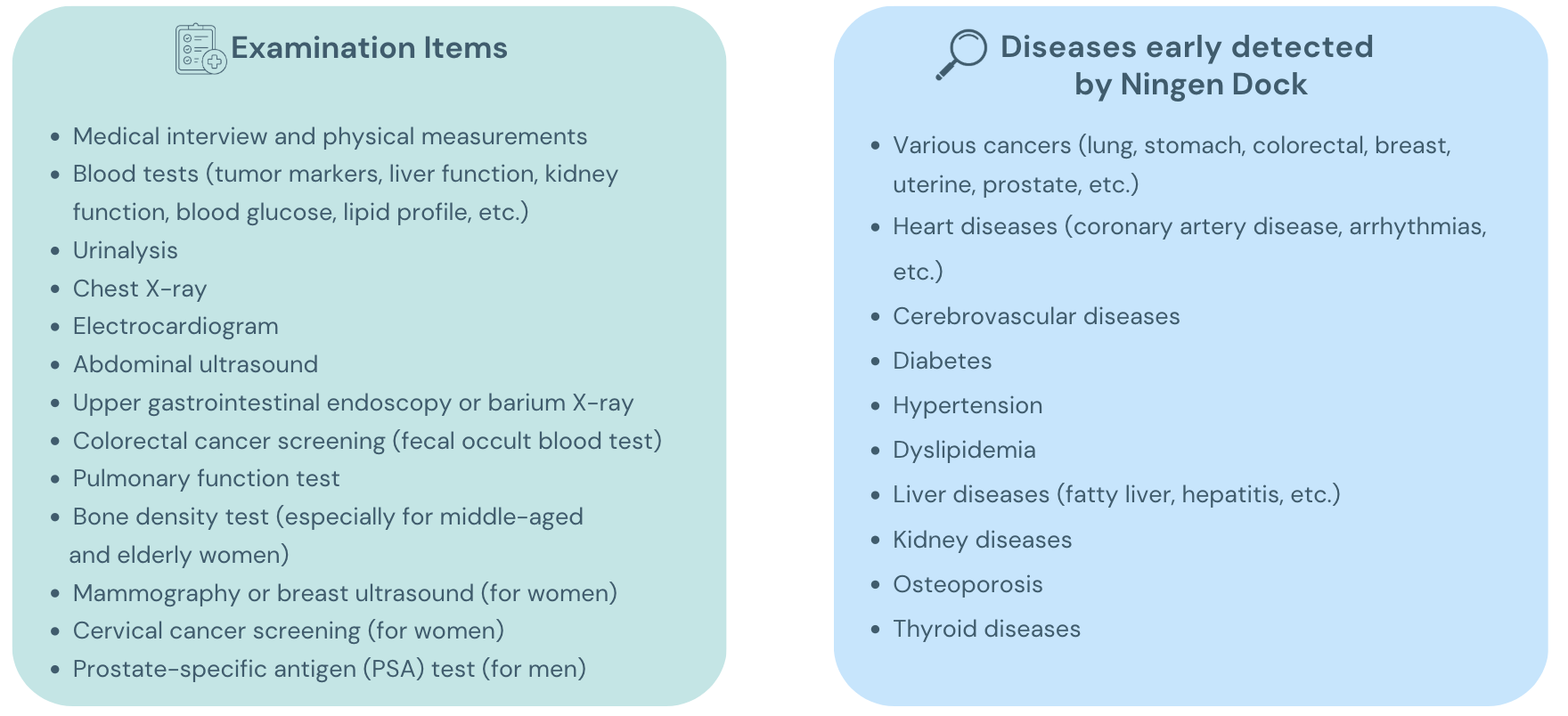The number of visitors to Japan for medical tourism who undergo Ningen Dock (comprehensive health check-ups) is increasing annually. Ningen Dock, which originated in Japan in the mid-1900s, is a comprehensive health screening system for healthy individuals. It is conducted periodically to provide a comprehensive evaluation of current health status and predict future health risks, aiming to prevent diseases and enable early detection and treatment.
This article explains the history of Ningen Dock’s development in Japan and its current status.
Origins and Development of Ningen Dock
The concept of Ningen Dock began on July 1954, at the National Tokyo First Hospital (now the National Center for Global Health and Medicine). The term “Ningen Dock” was coined from the idea that humans should undergo regular health checks, similar to ships entering docks for periodic inspection and repair.

Initially, it involved a six-day hospital stay for examinations. Subsequently, similar services were introduced at St. Luke’s International Hospital and Aichi Central Health Counseling Center, gradually spreading nationwide. In 1958, St. Luke’s International Hospital developed a one-night, two-day examination format similar to the current system, which rapidly gained popularity.
Since its introduction in 1954, Ningen Dock has developed rapidly and spread throughout Japan. Currently, about 3.7 million people undergo Ningen Dock annually in Japan. This figure demonstrates the high health consciousness of Japanese people and their trust in the effectiveness of Ningen Dock.
Ningen Dock Examination Items
The main objectives of Ningen Dock are early cancer detection, lifestyle disease screening, and health status confirmation. To achieve these goals, Ningen Dock typically includes the following examinations. Many medical institutions also offer optional additional tests beyond the basic items and these examinations enable early detection of various diseases.

Characteristics of Ningen Dock and Its Contribution to Health Promotion
Japanese Ningen Dock differs from health screening systems in other countries in the following ways:
Comprehensive examination items:
Ningen Dock includes a wide range of tests such as blood tests, urinalysis, chest X-rays, abdominal ultrasounds, and endoscopies, allowing for a comprehensive evaluation of overall health.
Prevention-focused approach:
Ningen Dock not only focuses on early disease detection but also emphasizes predicting and preventing future health risks, reflecting the Japanese medical system’s focus on preventive medicine.
Utilization of advanced medical technology:
The use of state-of-the-art medical equipment such as PET-CT scans and MRI for examinations is common, enabling more precise diagnoses.
Personalized health guidance:
Based on the examination results, doctors provide detailed explanations and lifestyle improvement advice to individual examinees.
Ningen Dock contributes to health promotion in the following ways:
Early detection and treatment:
Ningen Dock enables early detection and treatment of serious diseases such as cancer, heart disease and stroke. If the test results indicate a high possibility of a certain illness, undergoing detailed examinations at a hospital can lead to early detection and treatment.
Prevention of lifestyle-related diseases:
By early identification of risk factors for hypertension, diabetes, dyslipidemia, and other lifestyle-related diseases, appropriate interventions can be made to prevent the onset of these conditions.
Increased health awareness:
Regular health check-ups raise examinees’ health consciousness, leading to the maintenance of healthy lifestyle habits.
Long-term health management:
Continuous check-ups allow for tracking changes in an individual’s health status over time, enabling more effective health management.
Prospects for Medical Tourism
International demand for Japanese medical tourism, particularly for Ningen Dock, is on the rise. In 2019, the number of visitors to Japan for medical purposes reached 1.22 million, with many seeking Ningen Dock or health check-ups. The number of health-conscious customers undergoing annual Ningen Dock in Japan is increasing for the following reasons:
1. High-quality medical services:
Many Japanese medical institutions have obtained international certifications and introduced the latest medical technologies, enabling them to provide world-class medical services
2. Precise diagnostic technology:
Japanese medical institutions are equipped with high-precision diagnostic tools such as PET-CT scans and MRI, offering Ningen Dock menus utilizing these technologies. This allows for more accurate and detailed health assessments.
3. Comprehensive health evaluation:
Japanese Ningen Dock goes beyond mere disease screening to provide a comprehensive evaluation of overall health status, reflecting Japan’s medical approach that emphasizes preventive medicine.
4. Omotenashi culture:
Japanese medical institutions are known for their meticulous patient care and clean environments, which are attractive elements for medical tourists.
5. Synergy with tourism:
Japan is also popular as a tourist destination with rich culture and natural landscapes, making packages combining medical care and tourism as an attractive option.
Conclusion
Japanese Ningen Dock has gained high recognition both domestically and internationally for its comprehensive approach, advanced medical technology, and meticulous patient care. As the importance of preventive medicine is increasingly recognized worldwide, the Japanese Ningen Dock model is beginning to influence health management systems in other countries.
In the field of medical tourism, Japanese Ningen Dock has unique strengths and is expected to continue growing. Language barriers and cultural considerations in Japan are being addressed by facilitators, and Japanese medical institutions are expected to continue providing high-quality preventive medical services to patients from around the world.
Ningen Dock has the potential to contribute not only to individual health maintenance but also to reducing overall social medical costs. Early detection and treatment can prevent conditions from becoming severe and reduce treatment costs. The importance of such preventive medicine is likely to increase further from the perspective of extending healthy life expectancy and emphasizing quality of life.
<References>
1. Lu, J. (2022). Ningen Dock: Japan’s unique comprehensive health checkup system for early detection of disease. Global Health & Medicine, 4(1), 9-13.Kameda Health Appraisal Center. (n.d.).
2. National Center for Global Health and Medicine. (n.d.). Benefits and Features of the Screening. Retrieved from https://www.hosp.ncgm.go.jp/en/mec/features.html
3. National Center for Global Health and Medicine. (n.d.). The beginning of ningen dock (health checkups). Retrieved from https://www.hosp.ncgm.go.jp/en/aboutus/history/080/index.html
4. Shonan Kamakura General Hospital. (n.d.). Private Medical Check Up (Introduction). Retrieved from https://www.shonankamakura.or.jp/english/ningen-dock/
5. Japan Living Guide. (2023). Japan Health Check: What You Need to Know About This Service. Retrieved from https://www.japanlivingguide.com/expatinfo/healthcaresystem/health-check/
6. Lu, J. (2022). Ningen Dock: Japan’s unique comprehensive health checkup system for early detection of disease. PubMed Central. Retrieved from https://pmc.ncbi.nlm.nih.gov/articles/PMC8884042/
7. Nishimura, S., et al. (2018). Our Experience of Performing Ningen Dock for Foreign Tourists. Official Journal of Japan Society of Ningen Dock, 33(1), 50-54.
